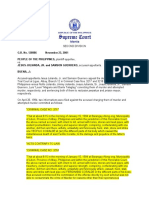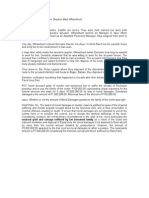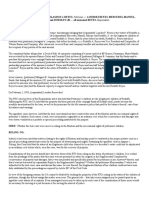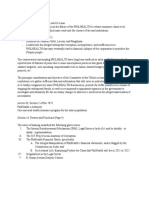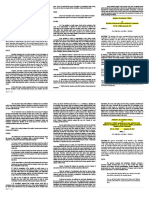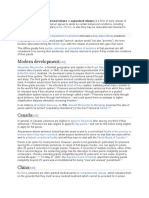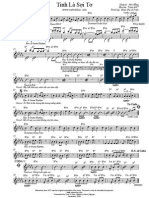0 ratings0% found this document useful (0 votes)
34 views"G" HOLDINGS vs. NAMAWU ET AL DIGEST
"G" HOLDINGS vs. NAMAWU ET AL DIGEST
Uploaded by
ruelGHI bought 90% of MMC's shares and financial claims, which were converted into promissory notes totaling P500M secured by mortgages over MMC's properties. NAMAWU was the exclusive bargaining agent for MMC's rank-and-file employees. The court ruled that the deed of real estate and chattel mortgage between MMC and GHI was not entered into to evade satisfying legitimate claims against MMC. It found that MMC and GHI maintained separate corporate personalities, as the debt embodied in the promissory notes was established in court. Piercing the corporate veil requires clear evidence that one entity completely dominated the other, which was not found.
Copyright:
© All Rights Reserved
Available Formats
Download as DOCX, PDF, TXT or read online from Scribd
"G" HOLDINGS vs. NAMAWU ET AL DIGEST
"G" HOLDINGS vs. NAMAWU ET AL DIGEST
Uploaded by
ruel0 ratings0% found this document useful (0 votes)
34 views2 pagesGHI bought 90% of MMC's shares and financial claims, which were converted into promissory notes totaling P500M secured by mortgages over MMC's properties. NAMAWU was the exclusive bargaining agent for MMC's rank-and-file employees. The court ruled that the deed of real estate and chattel mortgage between MMC and GHI was not entered into to evade satisfying legitimate claims against MMC. It found that MMC and GHI maintained separate corporate personalities, as the debt embodied in the promissory notes was established in court. Piercing the corporate veil requires clear evidence that one entity completely dominated the other, which was not found.
Original Title
“G” HOLDINGS vs. NAMAWU ET AL DIGEST
Copyright
© © All Rights Reserved
Available Formats
DOCX, PDF, TXT or read online from Scribd
Share this document
Did you find this document useful?
Is this content inappropriate?
GHI bought 90% of MMC's shares and financial claims, which were converted into promissory notes totaling P500M secured by mortgages over MMC's properties. NAMAWU was the exclusive bargaining agent for MMC's rank-and-file employees. The court ruled that the deed of real estate and chattel mortgage between MMC and GHI was not entered into to evade satisfying legitimate claims against MMC. It found that MMC and GHI maintained separate corporate personalities, as the debt embodied in the promissory notes was established in court. Piercing the corporate veil requires clear evidence that one entity completely dominated the other, which was not found.
Copyright:
© All Rights Reserved
Available Formats
Download as DOCX, PDF, TXT or read online from Scribd
Download as docx, pdf, or txt
0 ratings0% found this document useful (0 votes)
34 views2 pages"G" HOLDINGS vs. NAMAWU ET AL DIGEST
"G" HOLDINGS vs. NAMAWU ET AL DIGEST
Uploaded by
ruelGHI bought 90% of MMC's shares and financial claims, which were converted into promissory notes totaling P500M secured by mortgages over MMC's properties. NAMAWU was the exclusive bargaining agent for MMC's rank-and-file employees. The court ruled that the deed of real estate and chattel mortgage between MMC and GHI was not entered into to evade satisfying legitimate claims against MMC. It found that MMC and GHI maintained separate corporate personalities, as the debt embodied in the promissory notes was established in court. Piercing the corporate veil requires clear evidence that one entity completely dominated the other, which was not found.
Copyright:
© All Rights Reserved
Available Formats
Download as DOCX, PDF, TXT or read online from Scribd
Download as docx, pdf, or txt
You are on page 1of 2
“G” HOLDINGS vs.
NAMAWU ET
AL DIGEST
DECEMBER 21, 2016 ~ LEAVE A COMMENT
G.R. No. 160236 October 16, 2009
“G” HOLDINGS, INC., Petitioner,
vs.
NATIONAL MINES AND ALLIED WORKERS UNION Local 103
(NAMAWU); SHERIFFS RICHARD H. APROSTA and ALBERTO MUNOZ,
all acting Sheriffs; DEPARTMENT OF LABOR AND EMPLOYMENT, Region
VI, Bacolod District Office, Bacolod City, Respondents.
FACTS: The petitioner, “G” Holdings, Inc. (GHI), bought ninety percent (90%) of
MMC’s shares and financial claims. These financial claims were converted into three
Promissory Notes issued by MMC in favor of GHI totaling P500M and secured by
mortgages over MMC’s properties. National Mines and Allied Workers Union Local
103 (NAMAWU), was the exclusive bargaining agent of the rank and file employees
of Maricalum Mining Corporation (MMC).
GHI immediately took physical possession of the mine site and its facilities, and took
full control of the management and operation of MMC.
Almost four years thereafter, or on August 23, 1996, a labor dispute (refusal to
bargain collectively and unfair labor practice) arose between MMC and NAMAWU
ISSUE: WON the Deed of Real Estate and Chattel Mortgage was entered into
between MMC and G Holdings for the purpose of evading the satisfaction of the
legitimate claims of the petitioner against MMC.
HELD: No
Since the factual antecedents of this case do not warrant a finding that the mortgage
and loan agreements between MMC and GHI were simulated, then their separate
personalities must be recognized. To pierce the veil of corporate fiction would require
that their personalities as creditor and debtor be conjoined, resulting in a merger of the
personalities of the creditor (GHI) and the debtor (MMC) in one person, such that the
debt of one to the other is thereby extinguished. But the debt embodied in the 1992
Financial Notes has been established, and even made subject of court litigation (Civil
Case No. 95-76132, RTC Manila). This can only mean that GHI and MMC have
separate corporate personalities.
Neither was MMC used merely as an alter ego, adjunct, or business conduit for the
sole benefit of GHI, to justify piercing the former’s veil of corporate fiction so that the
latter could be held liable to claims of third-party judgment creditors, like NAMAWU.
Time and again, we have reiterated that mere ownership by a single stockholder or by
another corporation of all or nearly all of the capital stock of a corporation is not, by
itself, a sufficient ground for disregarding a separate corporate personality.
It is basic that a corporation has a personality separate and distinct from that
composing it as well as from that of any other legal entity to which it may be related.
Clear and convincing evidence is needed to pierce the veil of corporate fiction.
In this case, the mere interlocking of directors and officers does not warrant piercing
the separate corporate personalities of MMC and GHI. Not only must there be a
showing that there was majority or complete control, but complete domination, not
only of finances but of policy and business practice in respect to the transaction
attacked, so that the corporate entity as to this transaction had at the time no separate
mind, will or existence of its own. The mortgage deed transaction attacked as a basis
for piercing the corporate veil was a transaction that was an offshoot, a derivative, of
the mortgages earlier constituted in the Promissory Notes dated October 2, 1992. But
these Promissory Notes with mortgage were executed by GHI with APT in the name
of MMC, in a full privatization process. It appears that if there was any control or
domination exercised over MMC, it was APT, not GHI, that wielded it. Neither can
we conclude that the constitution of the loan nearly four (4) years prior to
NAMAWU’s notice of strike could have been the proximate cause of the injury of
NAMAWU for having been deprived of MMC’s corporate assets.
You might also like
- Montilla Jr. v. G HoldingsDocument3 pagesMontilla Jr. v. G Holdingsbalot cuiNo ratings yet
- Decision: Republic of The Philippines Court of Appeals Manila Special Sixteenth (16) DivisionDocument48 pagesDecision: Republic of The Philippines Court of Appeals Manila Special Sixteenth (16) DivisionVERA FilesNo ratings yet
- de Roy V CA, 157 SCRA 757Document1 pagede Roy V CA, 157 SCRA 757FranzMordenoNo ratings yet
- Nippon&Sumitomo Steel Sheet PilesDocument20 pagesNippon&Sumitomo Steel Sheet PilesQNo ratings yet
- Digest Padilla Vs CA HRLDocument3 pagesDigest Padilla Vs CA HRLYe Seul Dvngrc100% (1)
- 7 Balus vs. BalusDocument7 pages7 Balus vs. BalusKaye Miranda LaurenteNo ratings yet
- Estacion Vs BernardoDocument20 pagesEstacion Vs BernardoMelissa AdajarNo ratings yet
- People vs. Julianda, JR., 370 SCRA 448, G.R. No. 128886, November 23, 2001Document13 pagesPeople vs. Julianda, JR., 370 SCRA 448, G.R. No. 128886, November 23, 2001Olga Pleños ManingoNo ratings yet
- 17 - Cabling vs. DangcalanDocument4 pages17 - Cabling vs. DangcalanKim BanceNo ratings yet
- People vs. WhisenhuntDocument1 pagePeople vs. WhisenhuntkelbingeNo ratings yet
- Mercado v. Nambi FLORESDocument2 pagesMercado v. Nambi FLORESCarlos JamesNo ratings yet
- A.C. No. 10483, - THE CHRISTIAN SPIRITISTS IN THE PHILIPPINES, INC. v. ATTY. DANIEL D. MANGALLAYDocument35 pagesA.C. No. 10483, - THE CHRISTIAN SPIRITISTS IN THE PHILIPPINES, INC. v. ATTY. DANIEL D. MANGALLAYDennis Jay A. ParasNo ratings yet
- Florentino V Encarnacion DigestDocument1 pageFlorentino V Encarnacion DigestCecille Therese PedregosaNo ratings yet
- JOAQUINO v. REYESDocument2 pagesJOAQUINO v. REYESKORINA NGALOY0% (1)
- 2009 Bar Question1Document4 pages2009 Bar Question1Joyce Somorostro Ozaraga100% (1)
- Evid 5Document18 pagesEvid 5Mico LrzNo ratings yet
- Republic V CoalbrineDocument3 pagesRepublic V CoalbrineCecille SaritaNo ratings yet
- Llanto vs. Alzona PDFDocument15 pagesLlanto vs. Alzona PDFAmerigo VespucciNo ratings yet
- 2009 People v. QuemeggenDocument6 pages2009 People v. Quemeggenalphonso floroNo ratings yet
- Sps. Serrano vs. CaguiatDocument2 pagesSps. Serrano vs. CaguiatryuseiNo ratings yet
- Almario-Templonuevo V Office of OmbudsmanDocument3 pagesAlmario-Templonuevo V Office of OmbudsmanJosef MacanasNo ratings yet
- Philippine National Bank Vs CADocument6 pagesPhilippine National Bank Vs CAHamitaf LatipNo ratings yet
- INTENGAN Vs CADocument2 pagesINTENGAN Vs CAJoona Kis-ingNo ratings yet
- 11 GO-TAN Vs TANDocument2 pages11 GO-TAN Vs TANWendell Leigh OasanNo ratings yet
- Digest 6 9 and 30Document6 pagesDigest 6 9 and 30SALMAN JOHAYRNo ratings yet
- De Borja Etc. vs. Tan Etc. and de BorjaDocument4 pagesDe Borja Etc. vs. Tan Etc. and de BorjaAngela AngelesNo ratings yet
- Suroza V HonradoDocument2 pagesSuroza V Honradokfv05No ratings yet
- ZCWD V CoaDocument2 pagesZCWD V CoaIrene Chris EcleoNo ratings yet
- MCC Industrial v. SsangyongDocument3 pagesMCC Industrial v. SsangyongAngela ConejeroNo ratings yet
- 1 China Banking Corp Vs CADocument4 pages1 China Banking Corp Vs CAy6755No ratings yet
- Admin Law ExamDocument16 pagesAdmin Law ExamAllen Windel BernabeNo ratings yet
- 1 - Guess The Brand LogoDocument6 pages1 - Guess The Brand LogoKalyan ChakravarthyNo ratings yet
- Phil-Am v. PKS PDFDocument2 pagesPhil-Am v. PKS PDFSean GalvezNo ratings yet
- 2006 Bir - Ruling - Da 745 06 - 20180405 1159 SdfparDocument3 pages2006 Bir - Ruling - Da 745 06 - 20180405 1159 Sdfpar--No ratings yet
- Pilipinas Bank vs. CADocument2 pagesPilipinas Bank vs. CAVince Llamazares LupangoNo ratings yet
- People vs. DavaDocument7 pagesPeople vs. DavaheyoooNo ratings yet
- Drugstore Assoc V National Council On Disability AffairsDocument9 pagesDrugstore Assoc V National Council On Disability AffairsBeltran KathNo ratings yet
- NRELDocument22 pagesNRELYan IcoyNo ratings yet
- Republic V de TensuanDocument3 pagesRepublic V de TensuanTootsie GuzmaNo ratings yet
- REM - PNB V Militar - CasedigestDocument1 pageREM - PNB V Militar - CasedigestJoahna GoyagoyNo ratings yet
- Wills Cases (Set 2)Document39 pagesWills Cases (Set 2)Yan PascualNo ratings yet
- Francia Vs IAC and Ho FernandezDocument2 pagesFrancia Vs IAC and Ho FernandezrollingrollNo ratings yet
- Banking Laws Case DigestDocument4 pagesBanking Laws Case DigestAl Shannen Nicole LabraNo ratings yet
- G.R. No. 23916 - People v. HernandezDocument3 pagesG.R. No. 23916 - People v. HernandezJerwin DaveNo ratings yet
- Crim Art 8 DigestsDocument19 pagesCrim Art 8 DigestsJonathan BravaNo ratings yet
- Nepomuceno vs. Court of AppealsDocument13 pagesNepomuceno vs. Court of Appealsyasuren2No ratings yet
- Special Torts in Human RelationsDocument98 pagesSpecial Torts in Human RelationsXhin CagatinNo ratings yet
- Pale Day 5Document10 pagesPale Day 5Paulo SalanguitNo ratings yet
- Makati Stock Exchange vs. Campos G.R No. 138814 J April 16 J 2009Document1 pageMakati Stock Exchange vs. Campos G.R No. 138814 J April 16 J 2009Jefferson SombilloNo ratings yet
- SJS Officers V Mayor LimDocument3 pagesSJS Officers V Mayor LimAnonymous 7BpT9OWPNo ratings yet
- Nahimana, Brayagwisa, NgezeDocument14 pagesNahimana, Brayagwisa, NgezeYeyen M. EvoraNo ratings yet
- Criminal LawDocument21 pagesCriminal LawDee WhyNo ratings yet
- Crisologo V SingsonDocument2 pagesCrisologo V SingsonJasNo ratings yet
- Case Digest Legal FormsDocument52 pagesCase Digest Legal FormsChristine QuibodNo ratings yet
- Llanto Vs AlzonaDocument7 pagesLlanto Vs AlzonaRuth GaleraNo ratings yet
- Compiled Cases For Succession - EditedDocument156 pagesCompiled Cases For Succession - EditedJennica Gyrl DELFINNo ratings yet
- LZK Holdings Devt Corp vs. Planters Devt BankDocument2 pagesLZK Holdings Devt Corp vs. Planters Devt BankJune FourNo ratings yet
- EquItable PCI Vs NG Sheung Ngor G.R. No. 17154 December 19, 2007Document6 pagesEquItable PCI Vs NG Sheung Ngor G.R. No. 17154 December 19, 2007MarkNo ratings yet
- "G" Holdings vs. Namawu Et Al Digest: Decemb Er 21, 2016 VB DiazDocument3 pages"G" Holdings vs. Namawu Et Al Digest: Decemb Er 21, 2016 VB DiazGhee MoralesNo ratings yet
- Case DigestDocument10 pagesCase DigestRomy IanNo ratings yet
- Case Digest 01Document12 pagesCase Digest 01Jack RagodonNo ratings yet
- ParoleDocument3 pagesParoleruelNo ratings yet
- Administrative Officer IV Financial Analyst - CO PagadianDocument1 pageAdministrative Officer IV Financial Analyst - CO PagadianruelNo ratings yet
- Administrative Officer I II Encoder Processor - CO PagadianDocument1 pageAdministrative Officer I II Encoder Processor - CO PagadianruelNo ratings yet
- Sample COUNTER AFFIDAVIT-VAWC-INFIDELITY AS DEFENSEDocument10 pagesSample COUNTER AFFIDAVIT-VAWC-INFIDELITY AS DEFENSEruelNo ratings yet
- Administrative Officer III Records Officer - CO PagadianDocument1 pageAdministrative Officer III Records Officer - CO PagadianruelNo ratings yet
- Administrative Officer I Cashier - CO PagadianDocument1 pageAdministrative Officer I Cashier - CO PagadianruelNo ratings yet
- Filipino Style Creamy Bacon and Mushroom CarbonaraDocument23 pagesFilipino Style Creamy Bacon and Mushroom CarbonararuelNo ratings yet
- Letter To DfaDocument1 pageLetter To DfaruelNo ratings yet
- Deed of Sale by Co-Owners of Undivided PropertyDocument2 pagesDeed of Sale by Co-Owners of Undivided PropertyruelNo ratings yet
- San Miguel VS RiveraDocument12 pagesSan Miguel VS RiveraruelNo ratings yet
- Perez vs. PT&TDocument23 pagesPerez vs. PT&TruelNo ratings yet
- Samonte-Elepano VS La SalleDocument11 pagesSamonte-Elepano VS La SalleruelNo ratings yet
- Leus VS St. ScholasticaDocument18 pagesLeus VS St. ScholasticaruelNo ratings yet
- Mcburnie VS GanzonDocument38 pagesMcburnie VS GanzonruelNo ratings yet
- Christine Cadiz VS Brent HospitalDocument12 pagesChristine Cadiz VS Brent HospitalruelNo ratings yet
- Minsola vs. New CityDocument12 pagesMinsola vs. New CityruelNo ratings yet
- Lingnam VS Skills & TalentDocument11 pagesLingnam VS Skills & TalentruelNo ratings yet
- Allied Banking VS CalumpangDocument12 pagesAllied Banking VS CalumpangruelNo ratings yet
- Pspca vs. Coa DigestDocument2 pagesPspca vs. Coa DigestruelNo ratings yet
- KG PLC Announce 76 Planet Passionate Report v2Document2 pagesKG PLC Announce 76 Planet Passionate Report v2ElenaNo ratings yet
- UNIT 5 - Tell Me About Your FamilyDocument2 pagesUNIT 5 - Tell Me About Your FamilyJaya SampurnaNo ratings yet
- Funskool: Team Simark SimsreeDocument17 pagesFunskool: Team Simark SimsreeAkash BhangareNo ratings yet
- TM Global Opening 00213eDocument49 pagesTM Global Opening 00213eguozinhoNo ratings yet
- Chapter Eight: 8. Foriegn Exchange MarketsDocument26 pagesChapter Eight: 8. Foriegn Exchange MarketsNhatty WeroNo ratings yet
- Notification DetailedDocument28 pagesNotification DetailedraghuNo ratings yet
- Law On Evidence: Atty. Rushid Jay S. SanconDocument51 pagesLaw On Evidence: Atty. Rushid Jay S. SanconRushid Jay Samortin SanconNo ratings yet
- Proposal: Nur Akmar Binti Ahmad AD 704PT 2019230593Document4 pagesProposal: Nur Akmar Binti Ahmad AD 704PT 2019230593nur akmaNo ratings yet
- St. Michael's Preparatory School: Application FormDocument2 pagesSt. Michael's Preparatory School: Application FormJay309No ratings yet
- Measuring The Financial Effects of Mitigating Commodity Price Volatility in Supply ChainsDocument15 pagesMeasuring The Financial Effects of Mitigating Commodity Price Volatility in Supply ChainsLejandra MNo ratings yet
- Which Occult Authorbook Has Taught You The MostDocument6 pagesWhich Occult Authorbook Has Taught You The MostMike Cedersköld75% (4)
- TinhLaSoiTo TrishThuyTrangDoanPhi BBM PDFDocument1 pageTinhLaSoiTo TrishThuyTrangDoanPhi BBM PDFthongit2512No ratings yet
- Excerpt From Apollo's Arrow: The Profound and Enduring Impact of Coronavirus On The Way We Live" by Nicholas ChristakisDocument4 pagesExcerpt From Apollo's Arrow: The Profound and Enduring Impact of Coronavirus On The Way We Live" by Nicholas ChristakisOnPointRadioNo ratings yet
- Brian Yves G. Resume (December 2022)Document3 pagesBrian Yves G. Resume (December 2022)eprints cebuNo ratings yet
- Meaning of Guerrilla Marketing Principles of Guerrilla Marketing Types of Guerrilla Marketing Advantages Disadvantages ConclusionDocument22 pagesMeaning of Guerrilla Marketing Principles of Guerrilla Marketing Types of Guerrilla Marketing Advantages Disadvantages ConclusionSachin SoniNo ratings yet
- Gec 7Document3 pagesGec 7jasper pachingelNo ratings yet
- When We Two PartedDocument13 pagesWhen We Two PartedJay. SelNo ratings yet
- Asics Case ReportDocument11 pagesAsics Case ReportScribdTranslationsNo ratings yet
- CE Mark - FinalDocument21 pagesCE Mark - Finalaboshok100% (1)
- United States v. Davilmar-Jehovany, 10th Cir. (2003)Document5 pagesUnited States v. Davilmar-Jehovany, 10th Cir. (2003)Scribd Government DocsNo ratings yet
- Republic vs. Marcos-ManotocDocument4 pagesRepublic vs. Marcos-ManotocElaine HonradeNo ratings yet
- OpenSAP Ce1 Week 4 All SlidesDocument80 pagesOpenSAP Ce1 Week 4 All SlidesHugo Gallardo SejasNo ratings yet
- These Zian HoudaDocument531 pagesThese Zian Houdayoussefriifi100% (1)
- Kallen - William James and Henri Bergson A Study in Contrasting Theories of Life ( (1914) )Document270 pagesKallen - William James and Henri Bergson A Study in Contrasting Theories of Life ( (1914) )Thomas_VongehrNo ratings yet
- A Guide To Creating Iconic Brand Identities. Logo Design LoveDocument4 pagesA Guide To Creating Iconic Brand Identities. Logo Design LoveTeodorico PelenioNo ratings yet
- English Tafsir Lectures - Shaban1445Document101 pagesEnglish Tafsir Lectures - Shaban1445RDNo ratings yet
- Form 3 Sow 2023 24Document6 pagesForm 3 Sow 2023 24NOR AIN BINTI MOHAMED Moe100% (2)
- Maharashtra Watsan Forward 0Document29 pagesMaharashtra Watsan Forward 0Durant DsouzaNo ratings yet
- Company Profile - RNDDocument13 pagesCompany Profile - RNDyayat supriatnaNo ratings yet







